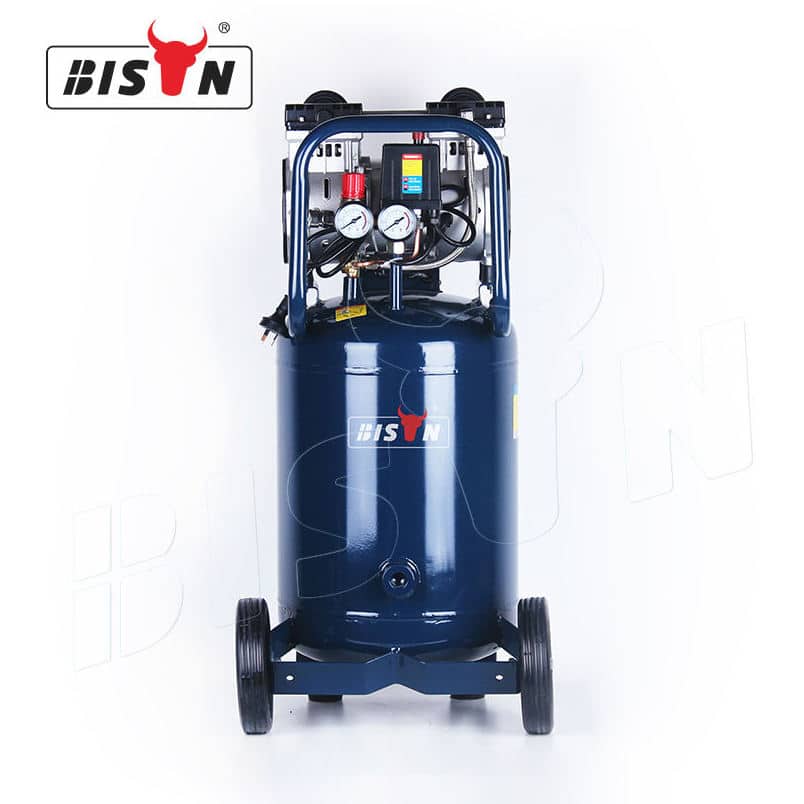air compressor blog
How to make an air compressor quieter
- May 22, 2023
Air compressors are essential tools used in various applications, from powering pneumatic tools to inflating tires. However, their operation often generates significant noise levels, which can be disruptive and bothersome in both residential and commercial settings.
Fortunately, BISON, as a professional air compressor manufacturer, will bring you ways to reduce the noise.

If you own or rent home improvement equipment like sanders, jackhammers, nail guns, and paint sprayers, you’re using some air compressors. These devices range from small pancake compressors to larger units that make moderate noise.
How to make an air compressor quieter?
You should have a more silent air compressor by wrapping the motor, covering the air intake with a muffler, encapsulating/enclosing the compressor, or moving the air intake. You can alternatively put rubber grommets around the unit’s motor or purchase a new air compressor.
Regardless of which of these options sounds most appealing to you, I encourage you to read on. We’ll detail all the ways to silence your air compressor.
Know your Air Compressor
Before we get into how to make your air compressor quieter, let’s discuss the various types of air compressors. There are eight types, and they are:
- Centrifugal compressors
Centrifugal air compressors are commonly used in turbomachinery operations. Using the impeller (rotor), the fluid passes through the compressor. This creates a velocity that increases the pressure within the device.
- Turbo compressors
Whether you call them axial, gas, or turbo compressors, this device uses airfoils that rotate to create air pressure.
- Scroll compressors
As the name suggests, a screw or scroll compressor moves in a circular motion. They are often part of an air conditioning system because they move refrigerant and air.
- Rotary vane compressors
A rotary vane compressor includes vanes that allow the rotor to move within its cavity.
- Rotary screw compressors
This air or gas compressor is a positive displacement device that can achieve high air pressure. If you use a jackhammer, it’s a rotary screw air compressor.
- Compound compressors
Several cylinders are arranged in stages to form a compound compressor. Air enters the first cylinder, is compressed, and then cools down. Next, it moves to another cylinder and compresses further.
- Single-stage reciprocating compressors
If the air is compressed only once, it is considered a single-stage reciprocating compressor.
- Two-stage reciprocating compressors
Likewise, if the air is compressed, passed through an intercooler, and then compressed further, the unit used is a two-stage reciprocating compressor.
No matter which of the eight air compressors you use, each type has several associated terms. These are as follows:
CFM: Cubic feet per minute or CFM measures the air being delivered from a compressor.
SCFM: SCFM means standard cubic feet per minute. It’s just CFM but standard. You’ll see CFM more often on air compressor packaging than SCFM.
HP: HP or horsepower is the power of the compressor motor. Most motors run as low as 1.5 HP and as high as 6.5 HP. You should expect higher HP compressors to be noisier.
PSI: Means pounds per square inch. This is simply the air pressure rating of the compressor. PSI can affect CFM, making it higher or lower.
All air compressors can be divided into three main categories. The first of these is the high-pressure air compressor or HPAC. They have discharge pressures over 1,000 PSI.
The discharge pressure of medium-pressure compressors varies more. It could be 151 PSI to 1,000 PSI.
Finally, there are low-pressure air compressors, also known as LPACs. They have the lowest discharge pressures, 150 PSI and below.
Finally, let’s talk about displacement. Air compressors are available as dynamic or positive displacement. For dynamic displacement, moving parts transform kinetic energy into pressure energy. An quick example of a compressor with dynamic displacement is a centrifugal compressor.
A positive displacement compressor will take in air, deliver it to a chamber, and compress it to a certain pressure. The air then gets out of the chamber and into the outlet. Examples include vane compressors, two-stage reciprocating compressors and rotary screw compressors.
How loud is the air compressor, anyway?
Powering the equipment they do, air compressors are anything but quiet. If you’re in luck, your compressor might be 40 decibels. Larger, heavier equipment can exceed 90 decibels.
For your information, the average volume of most conversations you have is 55 to 65 decibels, so a 40-decibel air compressor is pretty quiet. Even a vacuum cleaner is 60 to 85 decibels loud.
Most lawnmowers make 90 decibels, while an airplane takes off from the ground and takes off at about 140 decibels. It is at this volume that hearing damage becomes a risk. Still, even prolonged use of items between 80 and 90 decibels can eventually cause hearing damage. It will take time, but if you run your air compressor too often, you could lose hearing early.
Why is the air compressor so loud? It has to do with several things. The first of these is location. If your air compressor is placed in the same room or place as you, you will be the first to suffer. Even if it’s in the same building, you’ll sometimes hear more than you’d like. The farther away the air compressor is from you, the better.
Regarding the size of your air compressor, you also have to consider the power supply. If you have a gas-powered air compressor, it will make more noise than an electric compressor would. This is due to all the hard work the air compressor’s motor has to do to get it up and running.
Friction is another factor that determines the noise level of a compressor. A dynamic displacement air compressor and all its moving parts have more friction. Positive displacement compressors tend to have fewer moving parts and less friction. This will make them quieter than dynamic displacement compressors.
Finally, if you want to reduce noise, air compressors vary in capacity and size. Low-volume inflators use pistons that move very, very fast. This also rapidly heats the interior of the compressor. You’ll hear all these parts when they move.
Tips to make your air compressor quieter
Industrial air compressors make a lot of noise, but there are ways to silence the noise. Sound insulation, vibration dampening, sound absorption, and general maintenance can significantly impact the actual or perceived noise level of a compressor. Here are ten tips for eliminating air compressor noise and creating a quieter, more comfortable workplace.
Choose a quiet compressor model
The noise level of different models of air compressors can vary widely. A typical rotary screw air compressor typically operates in the 70-75 decibel range – the equivalent of standing next to a busy highway. Reciprocating air compressors can produce noise levels as high as 85 decibels (dB). You need to increase your voice to be heard at this level, and the noise is considered a severe nuisance. So, to reduce the volume in your compressor room, the first thing you need to do is choose a quieter model. If this isn’t practical due to your air needs – don’t worry. There are many ways to quiet your existing compressor.
Move noisy air compressors away from the work area
The first step is to consider placing an air compressor. Putting the compressor in a dedicated room or in a remote corner away from areas where people work will go a long way toward reducing noise levels. Alternatively, you can place the compressor outside. The more distance you can have between your compressor and the area where people work, the less noise there will be. Of course, you must also consider the piping length when making air compressor placement decisions.
Create a sound barrier between the air compressor and the workspace
Placing the compressor in a closed room or behind a soundproof wall will help prevent noise transmission. Heavy concrete blocks provide better sound insulation than thin wooden walls. You can build an enclosure for smaller compressors to dampen the noise from the compressor instead of providing a dedicated room. Just make sure there is enough air space around the compressor and enough ventilation to prevent overheating; Contact Bison about the ventilation requirements for your compressor model.
Soundproof the compressor room with soundproof materials
For additional noise reduction, insulate the compressor room or enclosure with sound-deadening material. Acoustic blankets are an easy fix: drape them over the compressor casing or hang them on the walls of your compressor room. Foam panels or acoustic panels can also be added to the walls of the compressor room. Be sure to allow adequate airflow around the compressor. Use refractory materials and ensure they do not contact the compressor or other heat-generating machinery.
Wrap the compressor with soundproofing material
If your compressor is not placed in an enclosed space or area, you can wrap an acoustic blanket directly around the compressor. Acoustic blankets can go a long way in absorbing noise from an air compressor piston or rotor. Ensure the material is flame-retardant and will not block air intakes, exhaust ports, wires or hoses.
Install the intake muffler
A lot of the noise of an air compressor comes from resonating from the air intake, which creates a high-frequency pulsating noise. An intake muffler is a sound-deadening device that uses tubes or sound-deadening material to dampen the sound of incoming air. They also act as intake filters.
Place the compressor on rubber pads to absorb vibration
Vibration is another major contributor to air compressor noise levels. Vibrations caused by piston movement can be transmitted through the floor – which means noise is transmitted too. Rubber pads placed under the compressor will absorb vibrations and prevent them from being transmitted through the floor. Cork or plastic also has good shock-absorbing properties. Alternatively, you can use rubber grommets instead of full rubber pads on the air compressor mount. Rubber grommets, or feet, work similarly to mats, absorbing noise-causing vibrations and preventing them from traveling through the floor.
Check the lubrication level of the air end and bearings
A good air compressor is a quiet(er) air compressor that starts with proper lubrication. For oil-filled compressors, check the oil level several times a week to ensure it is not low, and change the oil at least once a year or more often than this, depending on your operating hours and condition. You will also need to lubricate the bearings in the air compressor motor. A well-lubricated compressor lasts longer and sounds better.
Replace the air filter
Your air compressor must work harder when the intake and inline air filters are loaded. When your motor works harder, it will also make noisier noise. When inlet filters look dirty or worn, replace them. Inline filters should be replaced annually or after 8,000 hours of operation. You can monitor or watch the pressure drop (the difference in pressure across the filter) to determine when to load the filter.
Tighten anything that rattles or vibrates
When your air compressor runs, the vibrations can cause things to loosen over time. Tighten any loose bolts or screws causing the unit to rattle, and check the bearings and belts to ensure everything is ok. Reducing excessive rattling will not only decrease the volume, but it will prevent more expensive repairs later.
Contact BISON For More Information On Air Compressors For Your Business
At BISON Compressor, we carry a wide range of air compressors, and complete compressed air systems to meet all your air compressor business. We’ve provided high quality service and custom solutions to companies worldwide. For more information about Bison Air compressor, feel free contact us.
frequently asked questions about How to make an air compressor quieter
Are there any quiet air compressors?
Yes, quiet air compressors have noise levels as low as 60 decibels. Rotary screw compressors tend to be quieter than reciprocating compressors. Additionally, some manufacturers offer soundproof enclosures or panels that can be added to existing compressors to reduce noise levels.
How can I make my industrial air compressor quieter?
To make an industrial air compressor quieter, you can reduce the noise produced by the compressor motor, piston cylinder, and compressed air. Adding soundproofing and using a sound enclosure or compressor room can also help. Proper maintenance, such as lubricating compressor parts, can also reduce noise levels.
Does reducing noise affect the air requirements of air tools?
Reduced noise does not affect the air requirements of the air tool. However, adding sound-absorbing material may cause a slight pressure drop. It must be ensured that the pressure is sufficient to provide proper power to the tool.
How can the average owner make their air compressor quieter?
Generally, the owner can install an air filter, install sound-absorbing materials such as soundproof panels or blankets, and place the compressor in a separate room or a soundproof enclosure. Additionally, proper lubrication and routine maintenance can reduce the noise level of your air compressor. Checking the compressor's motor for problems and tightening loose bolts or screws will also help.
If you have any enquiries about the BISON air compressor, we would love to hear from you.







